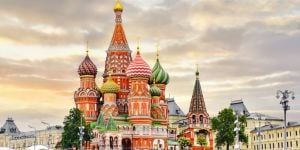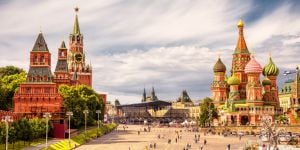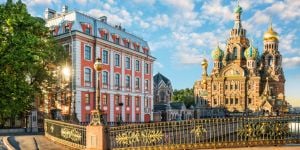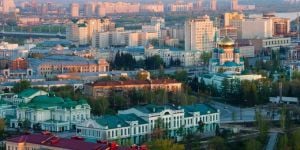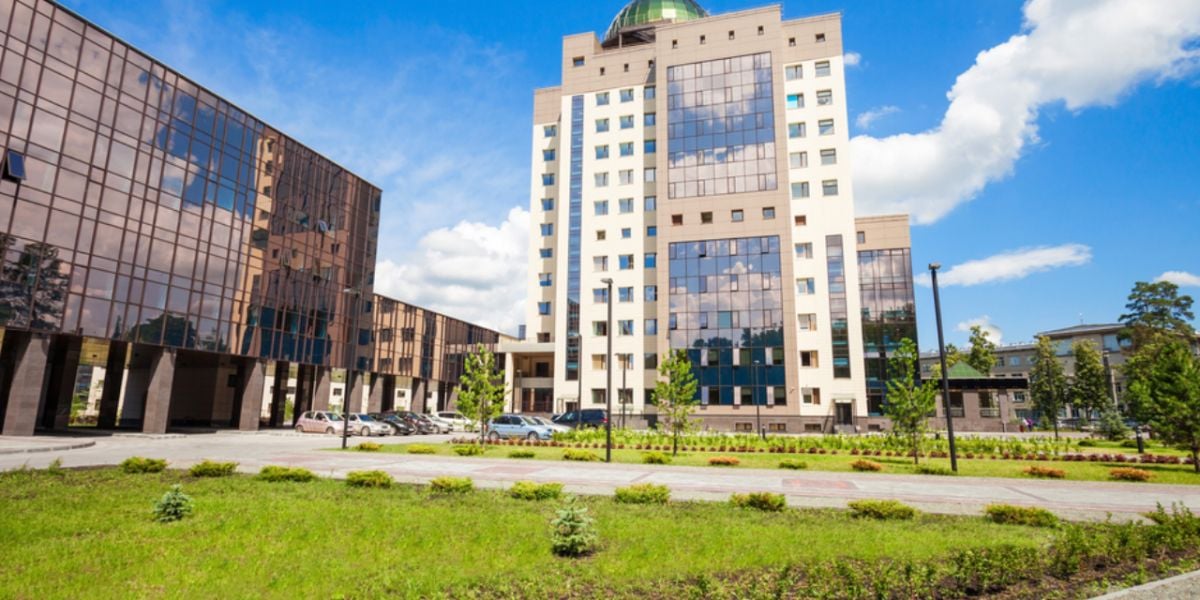
The third largest city in Russia and economic heart of Siberia, Novosibirsk is a rapidly developing city full of employment opportunities for young graduates. Students often have a tight budget and Novosibirsk can be the perfect compromise between life in a buzzing city and one in an expensive city, whilst still studying at a prestigious university.
The city hosts 34 universities which offer highly specialised courses. Novosibirsk also appears in the world's top 20 for affordability on the list of Best Student Cities of 2017 and is ranked 93rd in the QS best student cities ranking. Note that in most universities the vast majority of classes - if not all - are taught in Russian which is why international applicants have to provide a certificate of Russian language Level 1 as a minimum upon application to any degree. Most universities offer Russian language courses during the summer months to help international students before classes start on September 1st.
Novosibirsk State University (NSU)
Founded in 1958, Novosibirsk State University (NSU) is one of Russia's top universities. The university appears second best in the QS top universities in Emerging Europe and Central Asia and 291st in the whole world. It is ranked amongst the world's top 50 universities in physics and astronomy. It also figures in the top 101-150 universities for archaeology, mathematics and chemical technology, 151-200 for modern languages and in the top 200 for philosophy. The institute employs 1,038 academic staff for 7,204 students of which 1,342 come from abroad. The university is composed of 10 faculties: humanities, medicine and psychology, philosophy and law, geology and geophysics, mechanics and maths, sciences, physics, information technologies, economics and computer science.
NSU has developed several partnerships with 109 universities and organizations in 24 countries such as the DAAD, Alliance Française, Campus France, and Education USA and takes part in Erasmus . The university has close links with French, British, German, Spanish, Irish, and Slovenian institutes.
The campus is composed of 12 dormitories, one sports center with two swimming pools, one tennis court, one stadium, one small football field, two saunas, seven rooms for aerobics, gymnastics, wrestling, boxing etc. A place in the dormitories cost â¬2.17 per day.
Students can take part in student societies and even the student patrol. The patrol is made of 60 volunteers, all of them are students and professors from NSU, who ensure security on the campus and cooperate with the university administration and public organisations.
A bachelors degree at NSU costs â¬3,360, whilst a masters degree costs â¬3,890, and a PhD â¬4,110 (before tax). For the very few international students who manage to enrol for studies as part of the Russian state-financed quota, they pay the same fees as Russian students, i.e. for bachelors: between â¬917 for linguistics and â¬2,170 for management per year, for masters between â¬1,160 for journalism and â¬2,000 for computing science, and for a PhD between â¬1,120 for mass media and â¬2,170 for cardiology. Classes start September 1st and candidates can apply until June 15th. Documents to submit for application are an application form completed with one ID picture, copies of passport, medical insurance, negative HIV certificate, and the notarised Russian translation of previous diplomas and transcripts. Candidates also have to provide a certificate of Russian language Level 1.
Novosibirsk State Technical University (NSTU)
NSTU is Novosibirsk's second university to appear on the QS ranking. It is ranked 351-400 for engineering and electronics, 73rd on the QS Emerging Europe and Central Asia ranking, and 101-110 on the QS BRICS ranking. The institute is one of the largest in the region with 13,500 students, among which 15% are foreigners. The university possesses 30 research centers and offers 162 highly specialised courses such as information security of automated systems, software engineering, technical operation of aircraft and engines or even ballistics and hydro aerodynamics in 16 faculties.
NSTU has 10 dual degrees with partner universities in Kazakhstan, Mongolia, Finland, Czech Republic, Bulgaria, and Italy. On top of this, the institute takes part in Erasmus , InMotion, and Tempus MPAM and cooperates with 70 institutes in 23 countries.
The university has seven dormitories which can host 4,000 students. A place in a two or three people bedroom costs between â¬30 and â¬70 per month. Dormitories for international students have common equipped kitchens and bathrooms. NSTU campus has seven building units dedicated to sport as well as a ski depot.
Bachelor degrees at NSTU cost from â¬180 for a course in software engineering to â¬1,080 for a course in aircraft building per year, whilst masters cost from â¬400 for a degree in automatisation of technological processes and production to â¬1,160 for a degree in nanotechnologies and microsystems.
Documents to submit for application at NSTU are an application form filled in, copies of passport, and the notarised translation of previous diplomas and transcripts (in Russian) as well as a certificate of Russian language Level 1.
Siberian Transport University (STU)
Since its foundation in 1932, the Siberian Transport University has built a strong reputation and a great number of railway transport ministers, deputy ministers, chiefs of railways and CEO of transport ministry departments graduated from this prestigious institute. With branches in Tomsk, Belovo, and Novoaltaisk, the university counts 12,000 students of which 140 come from abroad, mostly neighbouring Asian countries. The STU has ten faculties: railway transportation management, railway construction, bridges and tunnels, building and road machines, civil engineering, engineering economics, international business and law, human resource management, information technologies in business and distance learning. The university campus is spread over 130,000 square meters and possesses its own training grounds equipped with a locomotive and carriages for crash testing, 15 research centres and laboratories, a library with over one million items, 4,000 of which are rare or unique copies from the 18th and 19th centuries, some 1,270 computers with internet access available to students, sport facilities such as skiing centres, a 25-metre long swimming pool, a gym, a stadium, a mini football field, tracks, and playgrounds as well as two open air tennis courts.
In the last two decades, the university's reputation has attracted students from neighbouring Asian countries such as China, Japan, Mongolia, North Korea, South Korea, Thailand, and Vietnam. Since 2000, the STU has built strong partnerships with Hokkai-Gakuen University (Japan), the Korean National College of Railway Transport, the Korean Railway Research Institute, Dongseo Korean University (South Korea), Pyongyang Railway University (North Korea), Beijing Transport University, Changchun University, Dalian Jiaotong University, Shenyang Ligong University and Qingdao Binhai University (China).
The university's seven dormitories can accommodate up to 2,000 students as well as their visitors who can stay in a hotel also located on the campus. Students have access to healthcare facilities as well as a branch of Novosibirsk Railway Hospital. The university's website does not provide much information about the dormitories' composition but expect to pay about â¬70 per month for a place in a shared bedroom. Medical insurance is compulsory and costs â¬70 per year. Tuition fees for international students are set as â¬3,000 per year. Add another â¬2,570 per year for Russian classes if you do not speak Russian well enough to undertake classes in Russian.
To enroll at the STU, you will need to send your application form and resume to the department of international relations before September 1st, when classes start.
Student Visa in Novosibirsk
To study in Novosibirsk you will need a visa. If you are already living in Russia on a work visa when applying to university, you may keep your visa so as to be able to keep working if you wish. If you do not have a visa you will need to apply for a student visa. Once your application has been accepted, the university will send you an invitation letter to apply for a visa in your home country. Documents required for a student visa may vary from one country to another but in most cases, you will need to provide the Russian consulate or embassy with the following:
- Your passport;
- A copy of the first two pages of your passport;
- An ID photo;
- A completed application form;
- An insurance policy valid for the first three months of your stay;
- The letter of invitation from the university;
- The proof of payment of the visa fees.
Work and Internship in Novosibirsk
While living in the university's dormitories is the cheapest option, for those who prefer the comfort and independence of an individual flat, it might be necessary to find a job to pay their rent and bills. Foreign students are not allowed to work whilst staying in Russia on a student visa. However, if you find a company ready to provide you with visa support you can work on their visa whilst studying. This is the safest way to combine studies, usually evening courses, with work during daytime.
It is also illegal for international students to undertake a paid internship. For unpaid internship options, your university in Russia may help you in your research. Sometimes they have a list of partners that take on a few students from the university each year.
Fees and scholarships
NSU
The cost of one year of study at NSU varies between â¬3,360 and â¬4,110. Exchange or visiting students may apply for a scholarship at their home university. For everyone else doing a full Russian degree, you may try your luck and enroll on a quota basis and therefore apply for the Russian government scholarship for foreign students. Note that the Russian government scholarships cover the full cost of tuition fees and some extra money is transferred to the student's student card if they choose to live in the university dormitories.
NSTU
Tuition fees at NSTU vary between â¬180 and â¬1,160 per year. However, exchange or visiting students may apply using the scholarship options available in their home country and full Russian degree students may apply for the Russian government scholarship.
STU
The STU has a set tuition fee of â¬3,000 per year for all degrees. The institute does not offer scholarships to foreign students but you may apply for the Russian government scholarship. The various steps of the procedure are explained here.
Finding an accommodation in Novosibirsk
For those who prefer independence and privacy, university dormitories might not be the most suitable option. If you wish to have your own bedroom but are not too bothered about sharing the rest of the facilities with other people, you may find a decent and central room from â¬175 per month and less than â¬300 for a one-bedroom flat.
Useful links:
Student monthly budget
Your accommodation budget will depend on the type of accommodation you choose. If you chose to live in the dorms, food will be your main expense. Expect to spend around â¬200 per month at the supermarket and â¬9 to eat out in a decent restaurant. As for taxis, Uber seems to be offering the most attractive prices and the best client service. Tariffs vary according to the time and distance traveled but are set beforehand and so traffic jam does not influence them once the client has agreed to the price. Beware of Yandex taxis as they do not always handle client complaints and do not offer refunds or discounts when their app or website have crashed and you ended up paying for unfulfilled trips. Young foreigners, women as well as men, are strongly advised to avoid unofficial taxis when traveling alone.
Student lifestyle and leisure in Novosibirsk
Novosibirsk is crossed by the world famous trans-Siberian railway which is definitely worth experiencing once in a lifetime. The Altai region is reachable from Novosibirsk on an overnight train and is one of the country's most untouched and green regions. There you can go rafting, fishing, horse-riding, hiking etc. One of Novosibirsk's top sights is the state academic opera and ballet theatre which is also Russia's biggest theatre. Another beautiful sight is Byzantine style Alexandre Nevsky cathedral, the city's first building to be built in bricks as well as its oldest orthodox place of worship.
If you have a tight budget for leisure, keep an eye on websites advertising discounts for various leisure activities such as virtual reality games, quests, and reduced entrance fee to labyrinths and other attractions. The city has plenty of museums to keep students busy at a reduced fare, usually at no more than â¬1. Given the location, the West-Siberian railway history museum is a must. It will tell you all about the construction of the longest railway line in the world. Finally, keep yourself updated on all events, exhibitions, and concerts happening in Novosibirsk.
Useful websites (in Russian) on what's going on in Novosibirsk:
Getting around in Novosibirsk
Transportation is cheap for students. It costs â¬12 for a monthly unlimited public transport card. As Russia's third most populated city and Siberia's largest city, Novosibirsk has many means of public transport and the sole underground metro in the Eastern part of the country. Novosibirsk's underground metro has 13 stations spread on two lines which cover 15 km of the city center. The city also has 129 tramways, 228 trolleybuses, 795 buses, and 872 minibuses.
We do our best to provide accurate and up to date information. However, if you have noticed any inaccuracies in this article, please let us know in the comments section below.
